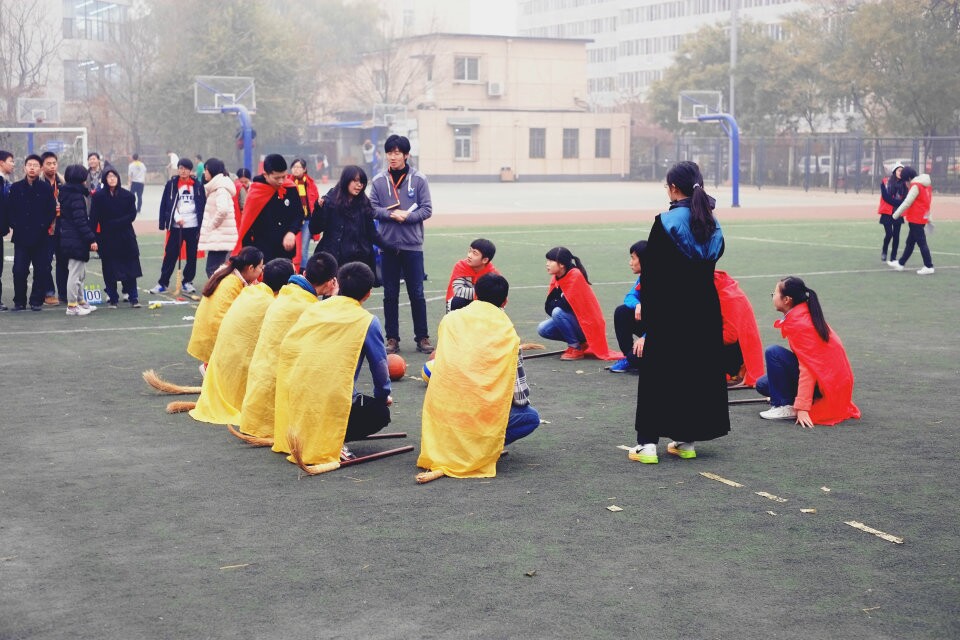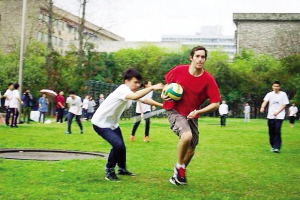Antwerp QC, Much of Belgian Core, Leaves Competitive Quidditch
“I called the game ‘Dragon Ball Z.’”
On Sept. 25, 2012, Eric Cheng started a quidditch team at his high school in Zhejiang, China. Two years later, Hangzhou No.14 High School is one of the most active quidditch teams in the country, with around 50 members and a close relationship with its sister team at the University of Pennsylvania.
“I had no idea about how real-life quidditch was played and thought I was the first one to come up with this game, so we played by our own style,” Cheng said of the team’s first practice. “The word ‘Dragon Ball Z’ was popular in our grade that time, so we named it ‘Dragon Ball Z.’”
In place of the three hoops used today, Cheng’s team used soccer goals, and instead of quidditch’s five balls, the high-schoolers only played with two–a quaffle and a golden snitch made out of paper and tape.
“We did not have any idea how a bludger could be placed in the game,” Cheng said. “We used brooms, but they were real brooms used for cleaning the classroom.”
In Cheng’s game, the snitch was hidden in the grass for the seekers to track down.
“In the movie, the golden snitch was flying all the time, and we knew it was hard to create things like that, but we still needed to create a feeling of finding,” Cheng said.
Cheng eventually found the IQA’s website online, and Hangzhou No.14 High School now plays by IQA rules.
In addition to Hangzhou No.14, China has quidditch teams at Hangzhou Foreign Language School, Zhejiang Normal University, Nanjing Normal University and Shanghai Normal University’s high school. Beijing Quidditch Club, a community team that once boasted 300 members, was split into four teams last November. Students from Peking University, China Foreign Affairs University and Beijing Jiaotong University broke away from Beijing Quidditch Club to form their own school-affiliated teams.
“The three school teams are all ‘science-fiction’ clubs, which could escape the rules of a [university] sports team,” said Jessica Jiamin Lang, the general adviser of Chinese Quidditch. “In China, it’s really hard to [create] a sports team.”
Universities in China are largely concerned with keeping students safe and see quidditch as an unnecessary danger, according to Lang.
The Chinese Quidditch Association was founded in 2014 to discuss how to develop and promote quidditch in China. On February 16, the CQA elected a new board, including a new president, a public relations and marketing team, an operations and finance team and a new gameplay department.
“We want to get a community together because we really need a national tournament,” Lang said. “We do not have a seat in the IQA because we do not have a national tournament right now.”
While Hangzhou No. 14 plays by official IQA rules, many teams do not have access to updated IQA rulebooks that are translated into Mandarin.
“Beijing Quidditch plays in capes. They’ve got off-pitch seeking. They do not have headbands, because we do not have a translated version of Rulebook 8,” Lang said. “We really need a new version of the rulebook.”
In China, quidditch is most popular in international high schools, where classes are taught in English, Lang said. Students at the international high schools often go to the United States for college, which results in fewer quidditch players staying in China to start teams at their universities.
Regardless of these obstacles, quidditch has a bright future in China.
“I would be proud to say that quidditch is growing at a speed which no other sport in history can catch up to… Looking at quidditch from an athletic viewpoint, we can really see what we have done and how much we have progressed,” Cheng said. “I am truly proud to be a quidditch athlete.”
Archives by Month:
- May 2023
- April 2023
- April 2022
- January 2021
- October 2020
- September 2020
- July 2020
- May 2020
- April 2020
- March 2020
- February 2020
- January 2020
- December 2019
- November 2019
- October 2019
- August 2019
- April 2019
- March 2019
- February 2019
- January 2019
- November 2018
- October 2018
- September 2018
- August 2018
- July 2018
- June 2018
- April 2018
- March 2018
- February 2018
- January 2018
- November 2017
- October 2017
- July 2017
- June 2017
- May 2017
- April 2017
- March 2017
- February 2017
- January 2017
- December 2016
- November 2016
- October 2016
- September 2016
- August 2016
- July 2016
- June 2016
- May 2016
- April 2016
- March 2016
- February 2016
- January 2016
- December 2015
- November 2015
- October 2015
- September 2015
- August 2015
- July 2015
- June 2015
- May 2015
- April 2015
- March 2015
- February 2015
- January 2015
- December 2014
- November 2014
- October 2014
- September 2014
- August 2014
- July 2014
- May 2014
- April 2014
- March 2014
- February 2014
- January 2014
- November 2013
- October 2013
- September 2013
- August 2013
- July 2013
- June 2013
- May 2013
- April 2013
- March 2013
- February 2013
- January 2013
- December 2012
- November 2012
- October 2012
Archives by Subject:
- Categories
- Awards
- College/Community Split
- Column
- Community Teams
- Countdown to Columbia
- DIY
- Drills
- Elo Rankings
- Fantasy Fantasy Tournaments
- Game & Tournament Reports
- General
- History Of
- International
- IQA World Cup
- Major League Quidditch
- March Madness
- Matches of the Decade
- Monday Water Cooler
- News
- Positional Strategy
- Press Release
- Profiles
- Quidditch Australia
- Rankings Wrap-Up
- Referees
- Rock Hill Roll Call
- Rules and Policy
- Statistic
- Strategy
- Team Management
- Team USA
- The Pitch
- The Quidditch Lens
- Top 10 College
- Top 10 Community
- Top 20
- Uncategorized
- US Quarantine Cup
- US Quidditch Cup


